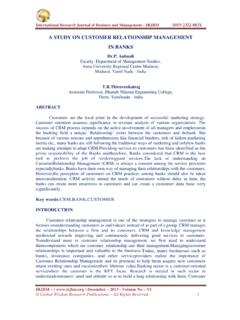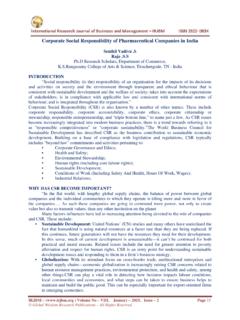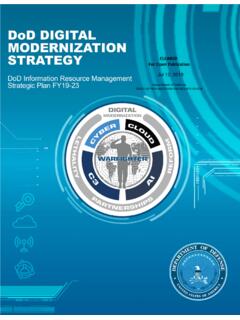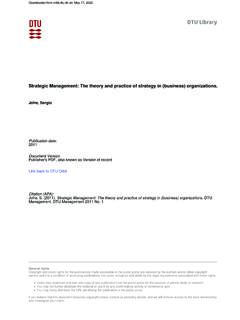Transcription of The Review of Modern Management Theories
1 IRJBM ( ) Volume No VIII, February 2015, Issue 3 Page 54 Global Wisdom Research Publications All Rights Reserved. The Review of Modern Management Theories Wasim Research Scholar Management Cyberjaya, Selangor - Malaysia Abstract Purpose: From the end of the nineteenth century began the era of great transformation in Management and move it from intuition and guesswork to the science of the principles, rules and Theories . The purpose of the study is to investigate the development trends of Management science and the extent of the contribution of the various Theories in the development of this science.
2 Findings: The paper presents contribution of previous and current managerial Theories in Management science. And what is the evolvement and trends of Management Theories we expect in the future? Keywords: Management Theories , Management evaluate, Management principles, Management concepts 1- Introduction The Management process is not born of the moment but is the prevailing concept of thousands of years. The Management process became a science has principles, objectives, and concepts in the late eighteenth century by many scientists like Taylor, Fayol, Ganti, and Follett. Although different in their views about the principles, objectives and concepts of the Management , but they considered the founding of the science of Management , especially Taylor, because many Modern scientists considered him the father of scientific Management .
3 19th century Management concept was success depends entirely on getting the initiative of the workmen and it was really a rare case this initiative is achieved(Taylor, 1911). This research aims to measure trends which took the Management as a science up or down from the late eighteenth century and even these nowadays, by identifying the ideas, concepts and principles adopted by these schools, Theories and gauge the credibility of their contribution to the development of this science by identifying the advantages and disadvantages and criticisms directed against it and that would be a good ground as well as the judgment in particular and independent over the increase efficiency and effectiveness of production in different organizations.
4 And I will also answer the question on the role of these ideas and Theories managerial during the twentieth century in the rescue or the sinking of many large companies and the giant and what are the proposals and recommendations that must be taken by pioneers of Management science on their shoulders in the future and make Management 's science a lifeboat for organizations commercial and industrial(Bookrage, 2010). Despite the emergence of Management science was the most important results of the industrial revolution and expansion of business, but the need for Management at this time became more important than the previous time due to the wide industrial and commercial organizations are very, very large.
5 These organizations have become more like the country and any impact on them may result in a negative effect beyond the internal environment of this Organization to include the whole state and in some cases, several may be will effect on many countries as a result of a global underlying these groups giant(Williams, 2011). Through my work on this study caught my attention in the news on television about the bankruptcy of more than 510 Japanese companies as a result of the devastating earthquake in Japan in 2011,Have IRJBM ( ) Volume No VIII, February 2015, Issue 3 Page 55 Global Wisdom Research Publications All Rights Reserved.
6 Wondered about the contribution of Management science in the bankruptcy of these companies have some answers to this question by saying that this event was the result of nature's fury and the managers cannot control it or prevent someone else may answer that the forecasting function is still needed to more of the Review . From this perspective, Henri Fayol (1841 1925) considers Management to consist of six functions: forecasting, planning, organizing, commanding, coordinating and controlling. He was one of the most influential contributors to Modern concepts of Management (Dunod, 1966). 2- Literature Review Many authors disagree about the true credit in the transformation of the administration of the art to science which based on the concepts and principles.
7 Some of them like Michael A. Hola Lewis felt that the real beginning of the science of Management has been at the hands of Charles Babbage. That Charles Babbage deserves to be recognized as a pioneer in the field of operations Management . His path-breaking contributions were born of a singular intellect and degree of creativity combined with a commitment to empiricist scientific method and statistical measurement. Moreover, he was working as Britain transformed itself into the most highly industrialized country the world had ever seen(Lewis, 2007).Also DANIEL A. WREN has considered Babbag one of the pioneers in Management science in his book (the evolution of Management thought).
8 But the majority of authors have considered Frederick Taylor as the "father of scientific Management "(Aitken, 1985). Over the past years, a number of authors have proposed a variety of approaches for classifying the Management Theories . Management Theories Here I will Review the most important Theories of Management during the eighteenth to 21st centuries, in accordance with the following approaches: 1- Scientific Management 2- Humanist Revolution (organizational behavior) 3- Competitive Strategy (based on industrial organization) Scientific Management Approach The core ideas of scientific Management were developed by Taylor in the 1880s and 1890s, and were first published in his monographs A Piece Rate System (1895), Shop Management (1903) and The Principles of Scientific Management (1911)(Beissinger, 1988).
9 The scientific Management approach emphasized empirical research for developing a comprehensive Management solution. Scientific Management principles are meant to be applied by managers in a very specific fashion. A fundamental implication of scientific Management is the manager is primarily responsible for increasing an organization's productivity. Its main objective was improving economic efficiency, especially labor productivity. It was one of the earliest attempts to apply science to the engineering of processes and to Management . Although scientific Management as a distinct theory or school of thought was obsolete by the 1930s, most of its themes are still important parts of industrial engineering and Management today.
10 These include analysis; synthesis; logic; rationality; empiricism; work ethic; efficiency and elimination of waste; standardization of best practices; disdain for tradition preserved merely for its own sake or merely to protect the social status of particular workers with particular skill sets; the transformation of craft production into mass production; and knowledge transfer between workers and from workers into tools, processes, and documentation. The major representatives of this school of thought are Frederick Winslow Taylor and Henry Fayol Frank and Lillian Gilbreth.








